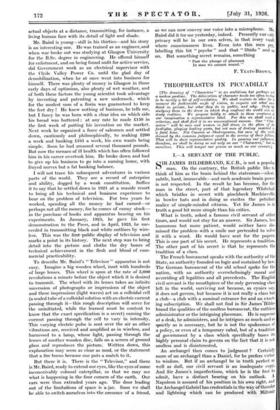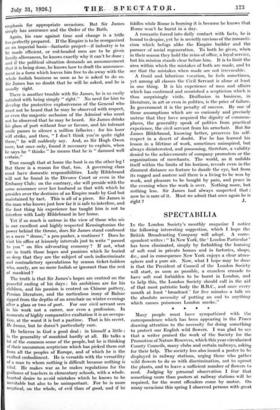THEOPHRASTUS IN PICCADILLY
[The drawing of " Characters" is an ambitious but perhaps not a useless pastime. The delineation of character tenls.too often to-day to be merely a bit of self-revelation. We shall venture to alter for a Moment the fashionable angle of vision, to enquire not what men think in private, but what they do in public, and why. Only by studying them in the dress in which they confront the world can we study realities. We propose boldly to attach to these creatures of our imagination a representative label. For this we shall need a criterion, and shall find it in an unexceptional success. Our " Clear. actere" will be men and women in full dress, in the glare of the footlights, playing leading parts, but not men of destiny matched to a fatal hour. Not Caesars or Shakespeare.% but men of the wall deemed by the common judgment equal to the service of their fellows. That will -be their representative' quality. In passing our judgment, therefore, we shall be doing so not only on. ottr." Characters,". but on ourselves. This will temper our praise as much as our censure.] I.---A SERVANT OF THE PUBLIC.
SIR JAMES HILDEBRAND, K.C.B., is not a popular man. On the contrary, the British public like to think of him as the brain behind the statesman—silent, subtle, hard, immovable—and such academic brain power is not respected. In the result he has become, for the man in the street, part of that legendary Whitehall which bristles in secret with pinchbeck Machiavellis in bowler hats and in doing so excites the petulant malice of simple-minded citizens. Yet Sir James is in truth a good bit more simple than his critics.
What is truth, asked a famous civil servant of other times, and would not stay for an answer. Sir James, less humorous but more patient, would neither have dis- missed the problem -with a smile nor pretended to solve it with a word. He would have sent for 'the papers. This is one part of his secret. He represents a tradition. The other part of his secret is that he represents the tradition of a class.
The French bureaucrat speaks with the authority of the State, an authority founded on logic and sustained by law. The German bureaucrat of the old school spoke for the nation, with an authority overwhelmingly moral and overriding all legalities and all precedents. The English civil servant is the mouthpiece of the only governing class left in the world, surviving not because, as cynics say, it does not govern, but because it is not really a class bilt a club—a club with a nominal entrance fee and an &act• ing subscription. We shall not find in Sir Jaines1Hilde. brand the qualities of the soulless bureaucrat, the ruthless administrator or the intriguing placemant He is supreme at a desk, lie adMinisters, and he intiigues as much and as quietly as is necessary, but he is not the spokesman of a policy, or even of a temporary cabal, but of a tradition of government by a class which specifically bases its highly personal claim to govern on the fact that it is not soulless and is disinterested.
An archangel then comes to judgment ? Certainly more of an archangel than a Daniel, for he prefers virtue to wisdom. But if an archangel be in truth perfect as well as dull, our civil servant is an inadequate copy. And Sir James's impeifections, which he is the first to admit, have a distinct bearing on his outlook. A Napoleon is assured of his position in his own right, and the Archangel Gabriel has credentials in the way Of thunder and lightning Which cari be produced with Miltonie emphasis for appropriate occasions. But Sir James simply has assurance and the Order of the Bath.
Again, his case against time and change is a trifle too perfectly prepared. If the Empire is to be reorganized on an imperial basis—fantastic project—Tif industry is to be made efficient, or red-headed men are to be given family allowances, he knows exactly why it can't be done ; and if the political situation demands an announcement that it is being done, he knows how to draft the announce- ment in a form which leaves him free to do away with the whole foolish business so soon as he is asked to do so. Sir James has no doubt that -he will be asked, and he is usually right.
There is another trouble with Sir James, he is so easily satisfied with being simply " right." No need for him to develop the protective explosiveness of -the General who must not be heard that he may be observed with respect, or even the majestic seclusion of the Admiral who must not be observed that he may be heard. Sir James drinks his glass of port without fear or favour, and his tolerant smile passes in silence a million fallacies : for his hour will strike, and then, " I don't think you're quite right there," he will suddenly say. And, as Sir Hugh Owen once, but once only, found it necessary to explain, when he says he " thinks " he means that he is " damned well certain."
True enough that at home the boot is on the other leg I But there is a reason for that, too. A governing class must have domestic responsibilities. Lady Hildebrand will not be found in the Divorce CoUrt or even in the Embassy Club; on the contrary, she will preside with the same assurance over her husband as that with which he presides over the destinies of an Empire made by God but maintained by tact. This is all of a piece. Sir James is the man who knows just hoiv far it is safe to interfere, and the first thing his experience has taught him is not to interfere with Lady Hildebrand in her home.
Yet if so much is untrue in the view of those who see in our excellent and highly respected Kensingtonian the power behind the throne, does Sir James stand confessed as a mere " drone," a pen-pusher, a routineer ? Does he visit his office at leisurely intervals just to write " passed to you " on files advocating economy ? If not, what are in truth those hopes and passions which lie buried so deep that they are the subject of such indiscriminate and Contradictory speculations by season ticket-holders who, surely, are no more foolish or ignorant than the rest of mankind ?
The truth is that Sir James's hopes are centred on the peaceful ending of his days : his ambitions are for his children, and his passion is centred on Chinese pottery, Persian literature, and the meticulous irony of Balzac sipped from the depths of an armchair on winter evenings after a glass or two of port. For our civil servant sees in his work not a career, nor even a profession. In moments of highly comparative exaltation it is an occupa- tion, at the worst it is but a pastime. That is his secret. Ile knows, but he doesn't particularly care.
He believes in God a good deal : in himself a little : in the generality of mankind hardly at all. He talks a lot of the common sense of the people, but he is thinking of their uncommon scepticism which has picked them out from all the peoples of Europe, and of which he is the exalted embodiment. He is versatile with the versatility of a man to whom nothing is difficult because nothing is vital. He makes war as he makes regulations for the guidance of teachers in elementary schools, with a whole- hearted desire to avoid mistakes which he knows to be inevitable but also to be unimportant. ,For he is more sceptical, on the whole, of evil than of good,- and if he fiddles while Rome is burning it is because he knows that Rome won't be burnt in a day.
A romantic forced into daily contact with facts, he is bound to despise, yet he is secretly envious of the romanti- cism which befogs alike the Empire builder and the pursuer of social regeneration. To both he gives, when in their season they hold the reins of office, a loyal service, but his mission stands clear before him. It is to liniit the area within which the mistakes of both are made, and 'to see that the mistakes when made are not irrevocable: A timid and laborious vocation, he feels sometimes, yet among all classes the Civil Servant is alone at least in one thing. It is his experience of men and affairs which has confirmed and nourished a scepticism which is thus surprisingly virile. Disillusion in business, in literature, in art or even in polities, is the price of failure. In government it is the penalty of success. By one of those assumptions which are so curiously and precisely untrue that they have acquired the dignity of common- places, the generality speak of politics from practical experience, the civil servant from his armchair. But Sir James Hildebrand, knowing better, preserves his self- respect in a desert of doubt. For he has learned his lesson in a lifetime of work, sometimes uninspired, but always disinterested, and possessing, therefore, a validity denied to the achievements of company promoters or the organizations of merchants. The world, as it unfolds itself within the limits of his horizon, reveals even in the dimmest distance no feature to dazzle the eye, but from its rugged and austere soil there is a living to be won by work, and pleasure to be bought by pain, and peace 'in the evening when the work is over. Nothing more, but nothing less. Sir James had always suspected that : now he is sure of it. Must we admit that once again he is



































 Previous page
Previous page